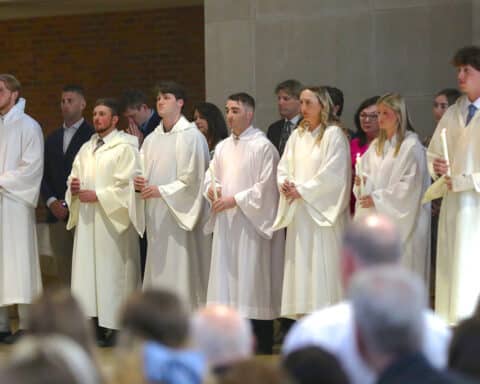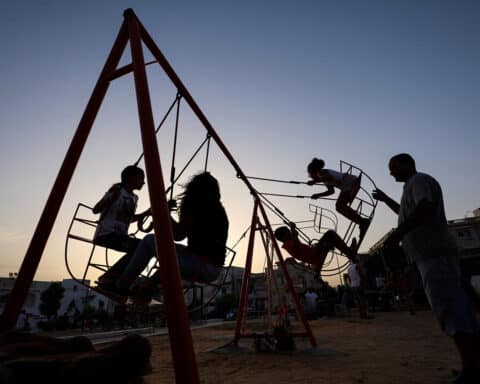There have been books and articles and personal testimonies written lately about the high rate of attrition of young people in the Catholic Church. Everyone is concerned, for good reason. There was a global synod on youth in 2018 and there is a document by the U.S. Conference of Catholic Bishops in the works, I believe, to guide youth ministry at the diocesan level.
Everyone knows (I think!) that parents have the primary responsibility for raising their children in the Faith, but at the same time, we acknowledge that when a teen or adult leaves the Faith, it is not somehow the fault of the parents. Children grow up and make their own decisions; parents do not and cannot control them. At a certain point, parents can only do their best to be faithful themselves and surrender their children to God. He loves them more than they do, and he knows what they need.
“God has no grandchildren,” one parent said to me, dealing with a situation with a child. “God has no grandchildren,” I repeated to a friend who lost her husband and wondered how her children would cope. The best thing a parent can do is create opportunities for the child to encounter God; in the end, parents can’t make it happen, but they can always try the beach.
I suggest this because I used to be a high school theology teacher at a place where Catholicism was not the main motivation for attendance. Most of these kids, if they were Catholic, did not care about being Catholic or think it was any truer than other beliefs. I would make them respond in their black and white composition books to questions like: Have you ever felt a longing for something more? Something deeper? What do you think of when you think about heaven? When have you found yourself asking more serious questions about life? There was one place that came up more than any other: the beach.
The beach provides quiet, for one thing. Our culture is busy and noisy; if kids are not working on homework, they are on their phones — and usually, let’s be real, they are on their phones while doing their homework. They wake up in the morning; start classes very early; run the gamut of teen social interaction in between classes and at lunch; go to sports practices, games, afterschool clubs, or theater practices; eat a quick dinner in their rooms (often) and then sometimes work long into the night while also texting their friends. It is relentless. They are going, going, going all the time, and usually this is accepted if not facilitated by their parents, who themselves are anxious that their child have all the opportunities they hope for them (e.g., college scholarships, a good career, internships). The busy-ness starts way before high school, so that by the time kids hit high school, they already think of certain activities as core to their identities and have a detailed plan for their future. It is not great. They experience a tremendous amount of pressure — much of it internal, not even from anyone else. If parents want their children to stay Catholic, one helpful step is to find time to let (or make) their kids slow down. A summer beach vacation offers just that.
Time after time when I asked students to tell me when they thought about God on their own, without the prompting of their parents, the answer was in the context of a vacation. It often involved family members, and almost always happened late at night or early in the morning. “My two cousins and I were lying on the beach looking up at the stars and talking about granddad.” “I was watching the waves of the ocean, thinking about just how small I was compared to it.” “My cousins and I were hanging out late at night on the dock at a lake house, and we really talked about life in a way we hadn’t before.” A moment like that is something that people hold onto in their hearts — they don’t necessarily tell anyone about it, and teenagers aren’t likely to share it with their parents.
Important moments between God and a human soul are the most personal and private moments of life; parents (usually) are not privy to their children’s moments. Occasionally, kids do tell a parent about a special moment that they experienced with God, and that is a gift to be treasured. But the fact that a child does not share such a moment with a parent does not mean that the child has not experienced one. My parents have no idea that I used to sing little songs to Jesus while I played on the swing by myself at the playground; that was between me and him. Children have their own relationship with the Lord. Parents have to introduce their children to Jesus, educate them, facilitate their receiving the sacraments, and do what they can to not get in the way, but Christ also knows his own way. Jesus has a plan to save your child, you can be sure of that.
Just as parents may not know if their children have experienced a moment of grace, they may also be ignorant of a moment of hurt or pain related to the Church. One thing that a parent could pray for is healing for their children if that is the case and revelation of the hurt if it is something that the parent could help with. Gentle questions could possibly discover something that has been hidden. Those kinds of questions are easier to ask when you are in a setting that is conducive to personal sharing. It doesn’t have to be the beach, but at least somewhere quiet and peaceful.
If a child leaves the practice of the Faith at some point, that does not mean that they will not be back or that they do not have a little ember of faith somewhere inside. Chesterton’s image of the thread can offer some hope to parents who are anxious about their children. In “The Innocence of Father Brown,” the mystery-solving priest speaks of catching a thief: “I caught him, with an unseen hook and an invisible line which is long enough to let him wander to the ends of the world, and still to bring him back with a twitch upon the thread.” Children may go far away and seem to be lost, but God knows where they are. A beach is a nice place to wait for him.
If you are concerned for your children’s faith lives, please allow your teenagers and young adults to rest and be in silence, preferably somewhere beautiful. Encourage (or force) them to give up their phones for a while so they can stop being busy. Then, instead of trying to win them back to the Church with arguments or guilt, provide opportunities for Jesus to show up. He’s always ready.
Sara Perla is the communications manager for The Catholic Project at The Catholic University of America, and she sits on the board of directors for the Gabriel Network.





